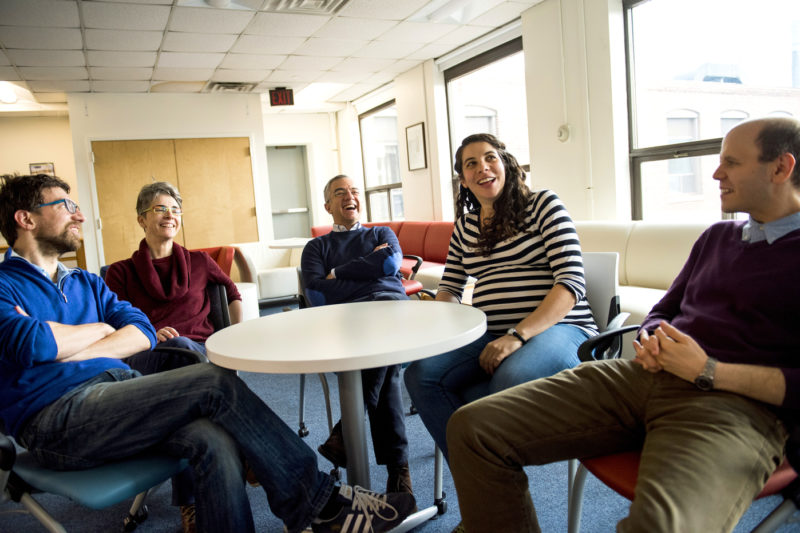Bolstering U.S. scientific competitiveness globally and training more young women and minorities in science, technology, engineering, and math have been national priorities in recent years. And findings from the Pew Research Center underscore the need. A recent survey found that the majority of Americans rate the country’s K-12 STEM education as average or worse compared to other developed nations. The center also highlighted statistics on the underrepresentation of women, blacks, and Hispanics in STEM fields.
Now, a team of Northeastern faculty is leading a project tied to that national directive that’s focused on preparing the next generation for careers in the mathematical sciences. The work is supported by a five-year, $2.3 million grant from the National Science Foundation’s Research Training Groups in the Mathematical Sciences program.

Postdoctoral researcher Robin Walters, Zelevinsky Research Instructor, explains his work to his research team in the mathematics department. Photo by Matthew Modoono/Northeastern University
Their work involves engaging with and training early scientists—from high school students, to undergraduate and graduate students, to postdoctoral researchers. They will particularly focus on algebraic geometry, the study of curves and surfaces defined by polynomial equations, and their higher dimensional analogues; representation theory, the mathematical theory of symmetry; and mathematical physics. These fields, they said, are also becoming increasingly valuable in solving real-world challenges emerging in such fields as condensed matter physics, quantum computing, and cryptography.
“This is a fruitful moment for research being done at the nexus of algebraic geometry, representation theory, and mathematical physics,” said Valerio Toledano Laredo, professor of mathematics at Northeastern.
A closer look at the project
The team of Northeastern mathematics faculty members consists of Christopher Beasley, Ana-Maria Castravet, Mboyo Esole, Donald King, Ivan Loseu, Emanuele Macri, Alina Marian, Jonathan Weits, and Toledano Laredo. Collectively, these faculty hold seven individual NSF awards, count three recipients of Sloan Research fellowships, one invited speaker at the 2010 International Congress of Mathematics and a recently elected fellow of the American Mathematical Society, one recipient of the 2017 Poincaré chair, and one recipient of the 2017 Next Einstein Fellow award.
Through this grant, they are hiring postdocs and doctoral research assistants; launching new lecture series, seminars, and courses; and creating new opportunities for undergraduate students to work in faculty labs on campus during the summer through the NSF’s Research Experiences for Undergraduates program. Plans also include hosting a major international conference on campus in the future.
The project also supports Northeastern undergraduate and graduate students serving as mentors to local youth through the Bridge to Calculus program and Girls’ Angle, a math club designed to foster girls’ interest in math. These mentoring opportunities will begin this year.
“We’re excited to build upon our department’s longstanding tradition of excellence, and increase the number of U.S. students interested in science,” Macri said. “This project is perfect for us in that sense.”
Originally published in News@Northeastern on February 7, 2018.

